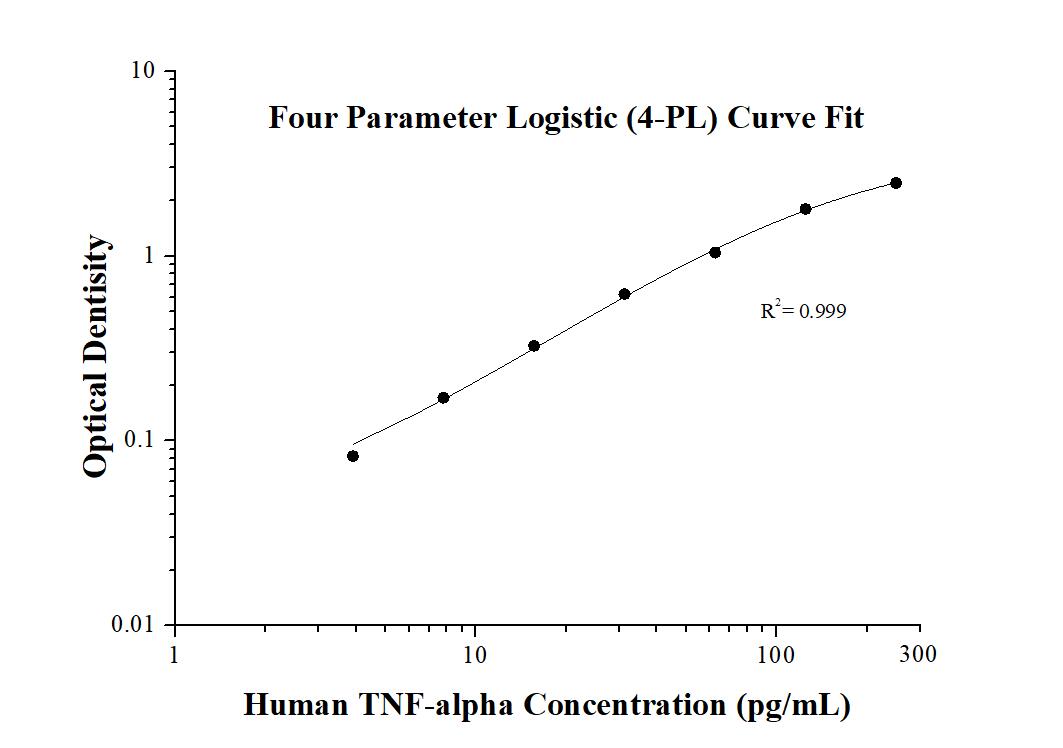Human TNF-alpha ELISA Kit
Cat no : KE00367
Synonyms
TNF,TNF alpha,TNF-a,C-domain 1,C-domain 2
Validation Data Gallery
Product Information
KE00367 is a solid phase sandwich Enzyme Linked-Immuno-Sorbent Assay (Sandwich ELISA). The human TNF-alpha ELISA kit is to be used to detect and quantify protein levels of endogenous human TNF-alpha. The assay recognizes human TNF-alpha. An antibody specific for human TNF-alpha has been pre-coated onto the microwells. The human TNF-alpha protein in samples is captured by the coated antibody after incubation. Following extensive washing, another horseradish peroxidase (HRP)-conjugated antibody specific for human TNF-alpha is added to detect the captured human TNF-alpha protein. For signal development, followed by Tetramethyl-benzidine (TMB) reagent. Solution containing sulfuric acid is used to stop color development and the color intensity which is proportional to the quantity of bound protein is measurable at 450 nm with the correction wavelength set at 630 nm.
| Product name | Human TNF-alpha ELISA Kit |
| Tests | 1 X 96 well plate |
| Sample type | Serum, Plasma, Cell culture supernatant |
| Assay type | Sandwich |
| Sensitivity | 0.4 pg/mL |
| Range | 3.9-250 pg/mL |
| Reactivity | Human |
| Tested applications | Sandwich ELISA |
| Gene ID (NCBI) | 7124 |
Recovery
| Sample Type | Average | Range |
|---|---|---|
| Human serum | 76% | 74%-81% |
| Cell culture supernatant | 90% | 84%-95% |
IntraAssay
| Sample | n | mean ( pg/mL) | SD | CV% |
|---|---|---|---|---|
| 1 | 20 | 130.2 | 4.7 | 3.6 |
| 2 | 20 | 27.6 | 1.3 | 4.9 |
| 3 | 20 | 5.6 | 0.5 | 9.3 |
InterAssay
| Sample | n | mean ( pg/mL) | SD | CV% |
|---|---|---|---|---|
| 1 | 24 | 124.7 | 5.3 | 4.2 |
| 2 | 24 | 29.2 | 1.5 | 5.0 |
| 3 | 24 | 6.5 | 0.6 | 9.5 |
Background Information
TNF, as also known as TNF-alpha, or cachectin, is a multifunctional proinflammatory cytokine that belongs to the tumor necrosis factor (TNF) superfamily. It is expressed as a 26 kDa membrane bound protein and is then cleaved by TNF-alpha converting enzyme (TACE) to release the soluble 17 kDa monomer, which forms homotrimers in circulation. It is produced chiefly by activated macrophages, although it can be produced by many other cell types such as CD4+ lymphocytes, NK cells, neutrophils, mast cells, eosinophils, and neurons. It can bind to, and thus functions through its receptors TNFRSF1A/TNFR1 and TNFRSF1B/TNFBR. This cytokine is involved in the regulation of a wide spectrum of biological processes including cell proliferation, differentiation, apoptosis, lipid metabolism, and coagulation. Dysregulation of TNF production has been implicated in a variety of human diseases including Alzheimer's disease, cancer, major depression and inflammatory bowel disease (IBD).
Properties
| Storage Instructions | All the reagents are stored at 2-8℃ for 6 months or -20℃ for 12 months. Refer to the protocol for further storage instructions. |
| Synonyms | TNF,TNF alpha,TNF-a,C-domain 1,C-domain 2 |
Publications
| Species | Sample Type | Title |
|---|---|---|
ACS Nano In Silico-Guided Discovery of Polysaccharide Derivatives as Adjuvants in Nanoparticle Vaccines for Cancer Immunotherapy | ||
Oral Health Prev Dent Study on the Mechanism of Nd:YAG Laser-Assisted Therapy on the Changes of Subgingival Flora in Periodontitis | ||
Drug Des Devel Ther Intraoperative Use of Sodium Bicarbonate Ringer's Solution Instead of Sodium Lactate Ringer's Solution to Reduce Endothelial Glycocalyx Degradation and Improve Postoperative Recovery During Cardiopulmonary Bypass Cardiac Surgery: A Single-Center Prospective Cohort Study | ||
J Nanobiotechnology Hypoxic glioma-derived exosomal miR-25-3p promotes macrophage M2 polarization by activating the PI3K-AKT-mTOR signaling pathway |
